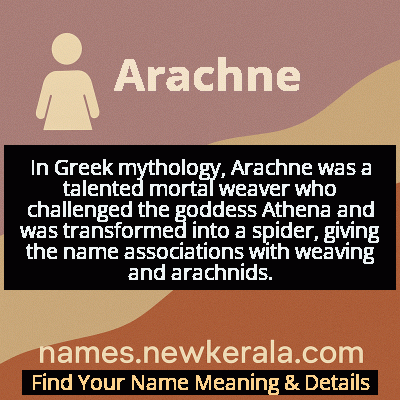Arachne Name Meaning & Details
Origin, Popularity, Numerology Analysis & Name Meaning of Arachne
Discover the origin, meaning, and cultural significance of the name ARACHNE. Delve into its historical roots and explore the lasting impact it has had on communities and traditions.
Name
Arachne
Gender
Female
Origin
Greek
Lucky Number
5
Meaning of the Name - Arachne
In Greek mythology, Arachne was a talented mortal weaver who challenged the goddess Athena and was transformed into a spider, giving the name associations with weaving and arachnids.
Arachne - Complete Numerology Analysis
Your Numerology Number
Based on Pythagorean Numerology System
Ruling Planet
Mercury
Positive Nature
Adventurous, dynamic, curious, and social.
Negative Traits
Restless, impatient, inconsistent, prone to indulgence.
Lucky Colours
Green, white.
Lucky Days
Wednesday.
Lucky Stones
Emerald.
Harmony Numbers
1, 3, 9.
Best Suited Professions
Sales, marketing, travel, entertainment.
What People Like About You
Versatility, charisma, adventurous spirit.
Famous People Named Arachne
Arachne (Mythological)
Mythical Weaver
Legendary weaver who challenged Athena and became the mother of all spiders
Arachne Jazmin
Contemporary Textile Artist
Creates large-scale spider-web inspired art installations exhibited internationally
Arachne Starlight
Fantasy Author
Bestselling author of mythological fantasy series with feminist themes
Name Variations & International Equivalents
Click on blue names to explore their detailed meanings. Gray names with will be available soon.
Cultural & Historical Significance
In modern times, Arachne's cultural significance has evolved to include feminist reinterpretations that view her not as a cautionary tale about hubris, but as a symbol of female creativity suppressed by patriarchal authority. Her name has become associated with women's crafts and textile arts, and she appears in contemporary literature and media as a complex figure representing both the dangers and necessities of artistic ambition. The scientific term 'arachnid' derives directly from her name, cementing her legacy in both cultural and scientific lexicons.
Extended Personality Analysis
Individuals named Arachne typically exhibit a complex blend of artistic sensitivity and intellectual rigor. They are often perfectionists who approach their work with meticulous attention to detail, much like the precise weaving of their mythological namesake. This dedication to craft can make them appear intense or single-minded, but it also drives them to achieve exceptional results in their chosen fields. Arachne-named individuals tend to be highly independent and resistant to authority, preferring to follow their own creative vision rather than conform to external expectations.
Their personality often includes a strong strategic mindset, approaching problems with the patience and complexity of a spider weaving its web. They excel at seeing connections others miss and building intricate systems or creative works. While they may struggle with collaboration due to their strong individual vision, their unique perspectives often lead to innovative breakthroughs. The shadow aspect of these traits can include stubbornness, difficulty accepting criticism, and occasional isolation as they become absorbed in their creative pursuits. However, their loyalty to their artistic principles and their ability to create beauty from complexity makes them remarkable and memorable individuals.
Modern Usage & Popularity
In contemporary naming practices, Arachne occupies a unique niche as a mythological name that is both recognizable and distinctive. While it has never reached mainstream popularity, it has seen increased usage in recent decades among parents seeking strong, literary names with classical roots. The name appeals particularly to families with interests in mythology, classical literature, or the arts. Modern usage often emphasizes the positive aspects of the myth - exceptional skill, creativity, and feminine power - while downplaying the cautionary elements. The name has found particular resonance in fantasy and gaming communities, where mythological names are celebrated. Despite its relative rarity, Arachne has maintained consistent usage, suggesting it appeals to a specific demographic that values cultural depth and uniqueness in naming choices. Its connection to spiders has also made it popular in scientific and naturalist circles, though this remains a minor trend.
Symbolic & Spiritual Meanings
Symbolically, Arachne represents the profound interconnection between creation, destruction, and transformation. Her story embodies the archetype of the artist whose skill becomes both their glory and their downfall, serving as a timeless metaphor for the risks and rewards of exceptional talent. The spider symbolism connects to deeper themes of fate, patience, and the intricate weaving of destiny. Arachne represents the creative feminine principle in its most potent form - the ability to spin reality from imagination, to create complex patterns from simple threads, and to transform raw materials into works of art. Her transformation into a spider symbolizes the eternal nature of true artistry - that which cannot be destroyed but only changed in form. In psychological terms, she represents the shadow self of the creator - the obsessive dedication to craft that can isolate one from community, yet also produces works of lasting beauty and significance. Her name has come to symbolize both the danger of challenging divine order and the necessity of artistic rebellion.

